Our City
300 days of sunshine
At the foot of the Rocky Mountains, Denver is known for sweeping views and a wide array of outdoor activitiesThe Neonatal Fellowship at the University of Colorado School of Medicine is a comprehensive program that combines extensive clinical teaching and exposure to rigorous research training to facilitate successful academic careers for graduates.
Program Director
| Associate Director 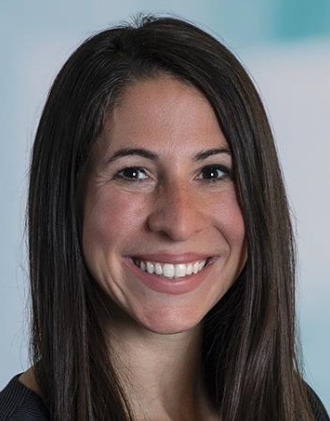 | Program Coordinator 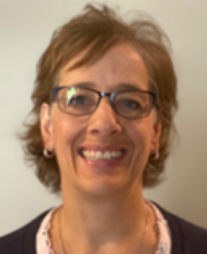 |
Jeanne Zenge, MD Program Director Email: Jeanne.Zenge | Nicolle Fernandez Dyess, MD, MEd Email: Nicolle.Dyess | Michele R. Bialkowski Program Coordinator Email: Michele.Bialkowski |
Our City
300 days of sunshine
At the foot of the Rocky Mountains, Denver is known for sweeping views and a wide array of outdoor activitiesOur Hospital
Ranked No. 1 in Rocky Mountain Region
Children’s Hospital Colorado consistently ranks in the top 20 on the U.S. News Best Children’s Hospitals Honor RollUC Health NICU
More than 650 patients every year
UCHealth is the largest Level III NICU in metro DenverChildren's NICU
2000 infants treated each year
Our NICU is designated as a Level IV facility by the American Academy of PediatricsTour UC Health NICU... | Tour Children's Colorado NICU... |
Overview
The University of Colorado Neonatal-Perinatal Fellowship program aims to provide comprehensive training in clinical neonatology across four key domains:
Fellows are supervised by a faculty with a diverse array of academic interests and have the opportunity to care for infants across a broad spectrum of gestational ages and disease processes. Education from direct patient care is complimented by our fellow lecture series, a protected half day of interactive didactic sessions that occurs each week. Fellows attend additional seminars focused on communication, ethics, and diversity and health equity throughout the year.
Research/Scholarly training is a major focus of the fellowship training program and fellows are provided substantial protected time throughout their fellowship to engage in rich research experiences. The research program is designed to provide comprehensive scholarly training that prepares all trainees with the background and skills to successfully compete for academic faculty positions and extramural funding at the completion of their fellowship. Although many neonatal fellows are mentored by a faculty member within the Division of Neonatology, the program encourages fellows to consider a broad range of potential mentors. The program will assist in identifying potential mentors, both within the Department of Pediatrics and, when appropriate, from across the School of Medicine campus.
Although we do not limit research topics to those within the neonatology section, we have faculty who are involved in various areas of investigation. Please select an area below for more details.
Click here to see a summary of the scholarly work each of our faculty members pursue.
Research Expectations
Each fellow in the program is expected to undertake a substantive scholarly project during their training. Fellows are expected to participate in all aspects of their individual research projects, including the development of hypotheses and study design, implementation of basic science techniques (such as whole animal surgeries and in-vivo studies or cell and molecular biology techniques) or IRB submission and patient enrollment, data collection and analysis, and abstract/manuscript presentation.
Scholarship Oversight Committees
Towards the end of the first year of training, each fellow is assigned a Scholarly Oversight Committee (SOC), composed of at least 3 faculty members. The SOC meets every six months, at a minimum, to evaluate the fellow’s scholarly progress and to help provide support and direction. At the end of training, the SOC is responsible for determining whether the fellow’s work has met the American Board of Pediatrics’ requirement for sub-board.
Timeline
| Recommended Research Timeline (dependent on type of research and project identified) | ||
| First Year | Second Year | Third Year |
Identify a mentor(s) and project by Fall Potential IRB submission or initial laboratory studies started by Spring | Ongoing data collection/patient recruitment Aim for abstract submission by Winter Attendance/presentation at Spring conferences such as Pediatric Academic Society (PAS) | Ongoing data collection and analysis Manuscript preparation Determination or initiation of follow-up studies |
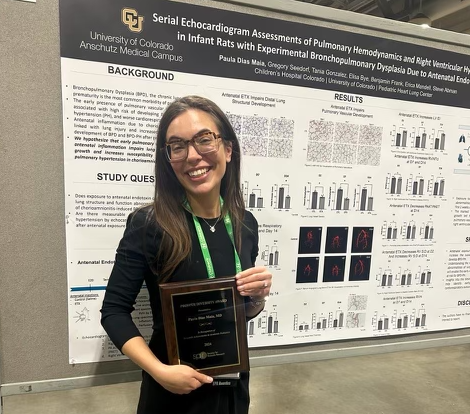
Basic Science Research
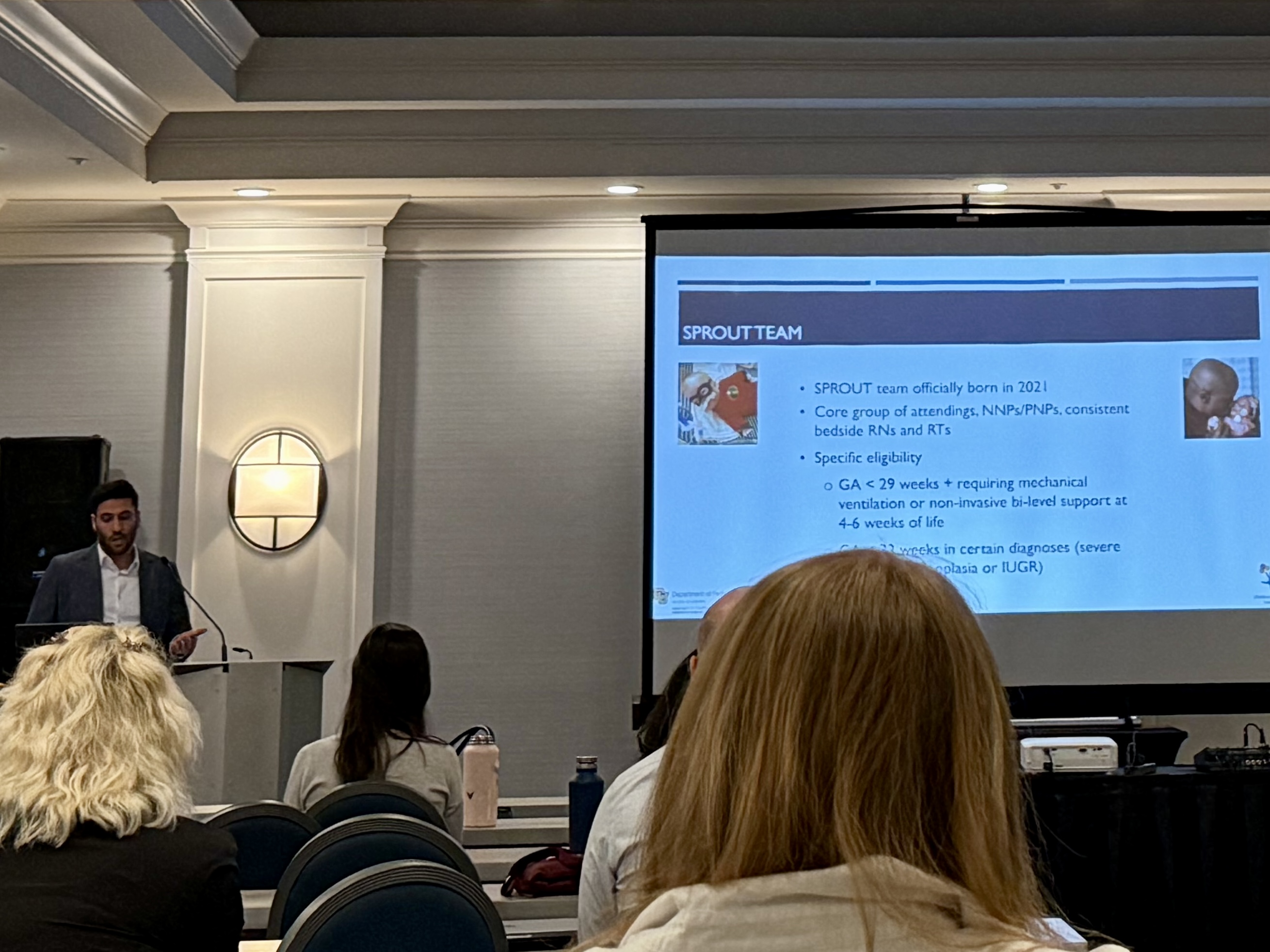
Clinical Research
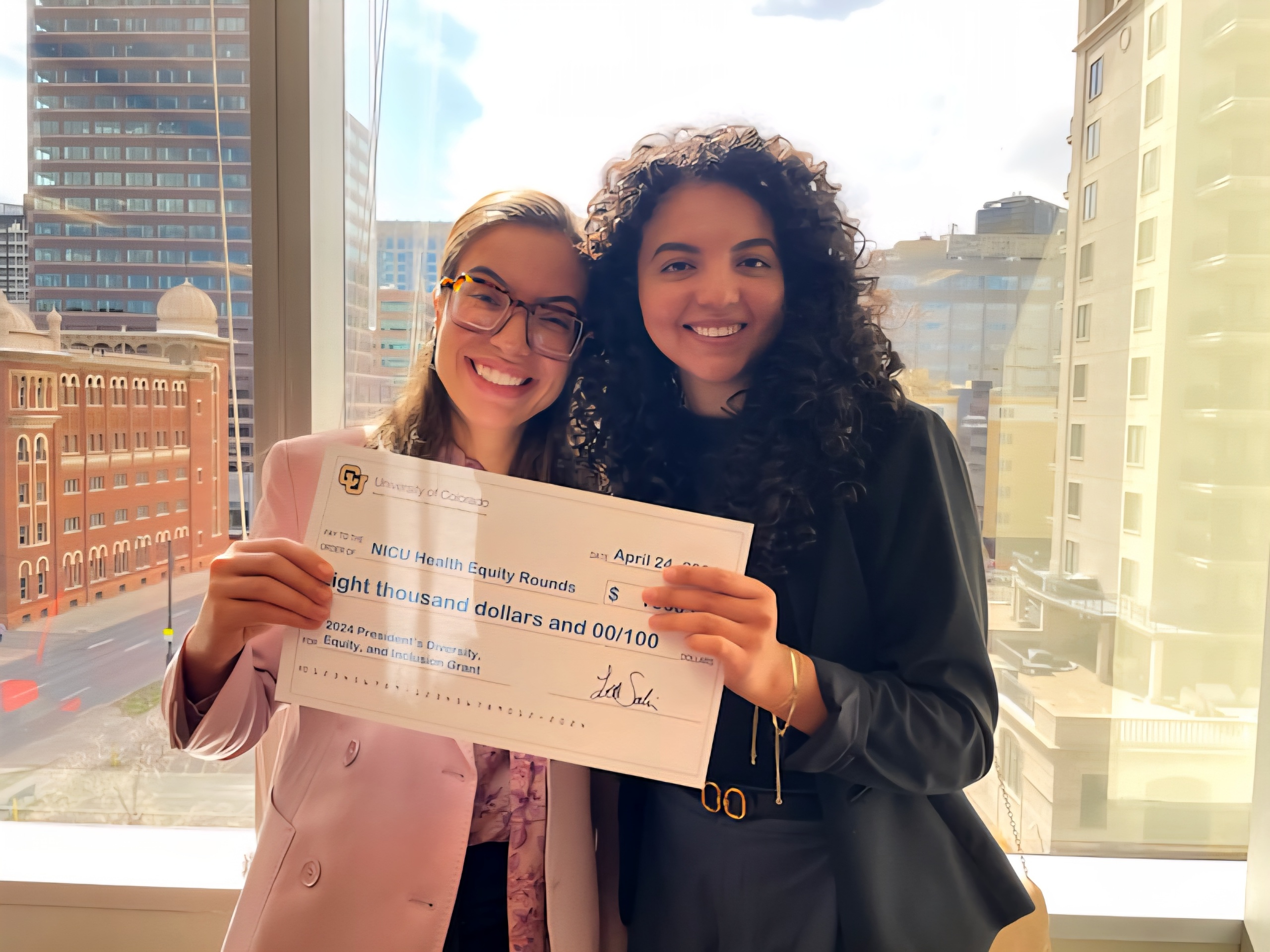
Health Services
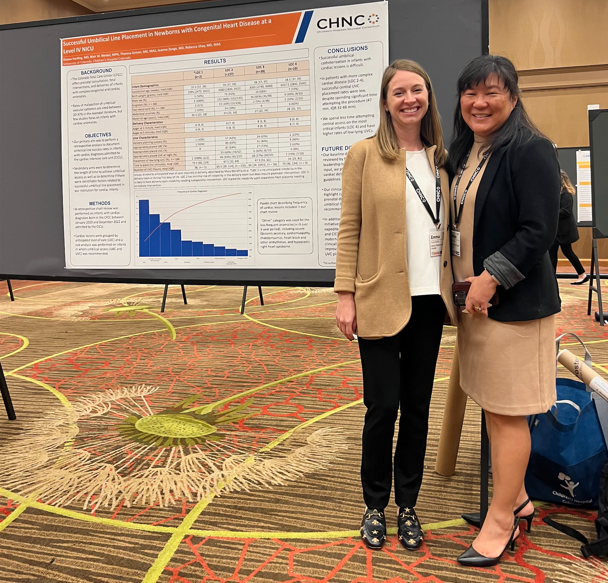
Quality Improvement
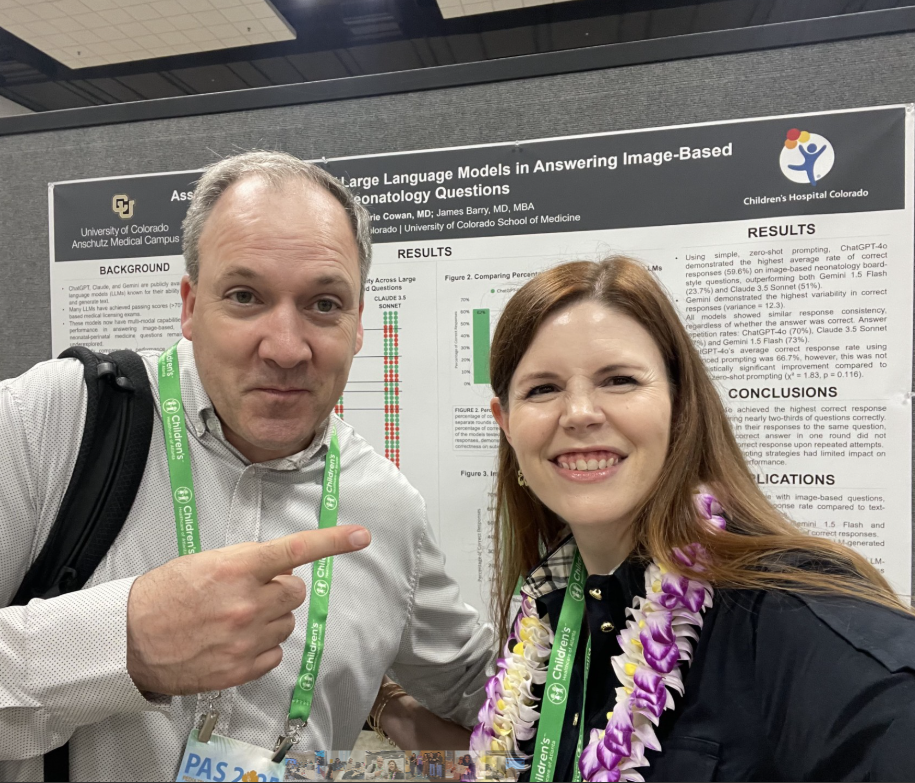
Medical Education

Overview
The University of Colorado Neonatal-Perinatal Fellowship program aims to provide comprehensive training in clinical neonatology across four key domains:
Fellows are supervised by a faculty with a diverse array of academic interests and have the opportunity to care for infants across a broad spectrum of gestational ages and disease processes. Education from direct patient care is complimented by our fellow lecture series, a protected half day of interactive didactic sessions that occurs each week. Fellows attend additional seminars focused on communication, ethics, and diversity and health equity throughout the year.
Upon graduation, our fellows are prepared to confidently and independently provide newborn resuscitation, perform all necessary hands-on procedures, and manage a broad range of neonatal problems. Our graduates have gone on to pursue careers as:

Scope of Clinical Training
Fellows in the Neonatal-Perinatal Medicine Fellowship Program complete their clinical training at two primary medical facilities on the University of Colorado Anschutz Medical Campus - Children's Hospital Colorado (CHCO) and University of Colorado Hospital (UCH). Both hospitals are affiliated with the University of Colorado School of Medicine and house state of the art Neonatal Intensive Care Units (NICU). The combination of these clinical sites, each with their own distinct patient population, provides fellows with comprehensive exposure to a myriad of neonatal complications.
Interested fellows may request to complete an additional rotation the historic Denver Health Medical Center (DHMC), a University of Colorado affiliated hospital that serves as the primary safety net facility for the city of Denver.
Fellows will have the opportunity to attend unique medical follow up clinics throughout their three years of training. The fellowship clinic experience complements our robust inpatient training to provide a more holistic understanding of our patients’ complex outpatient needs. Options for these clinics include but are not limited to the following:
Clinical Training Sites
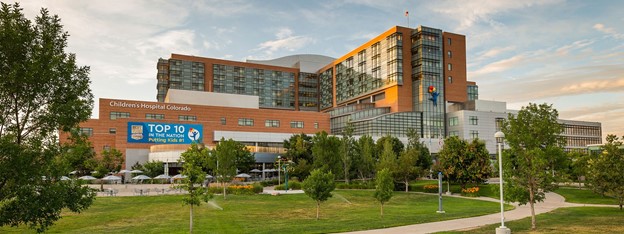
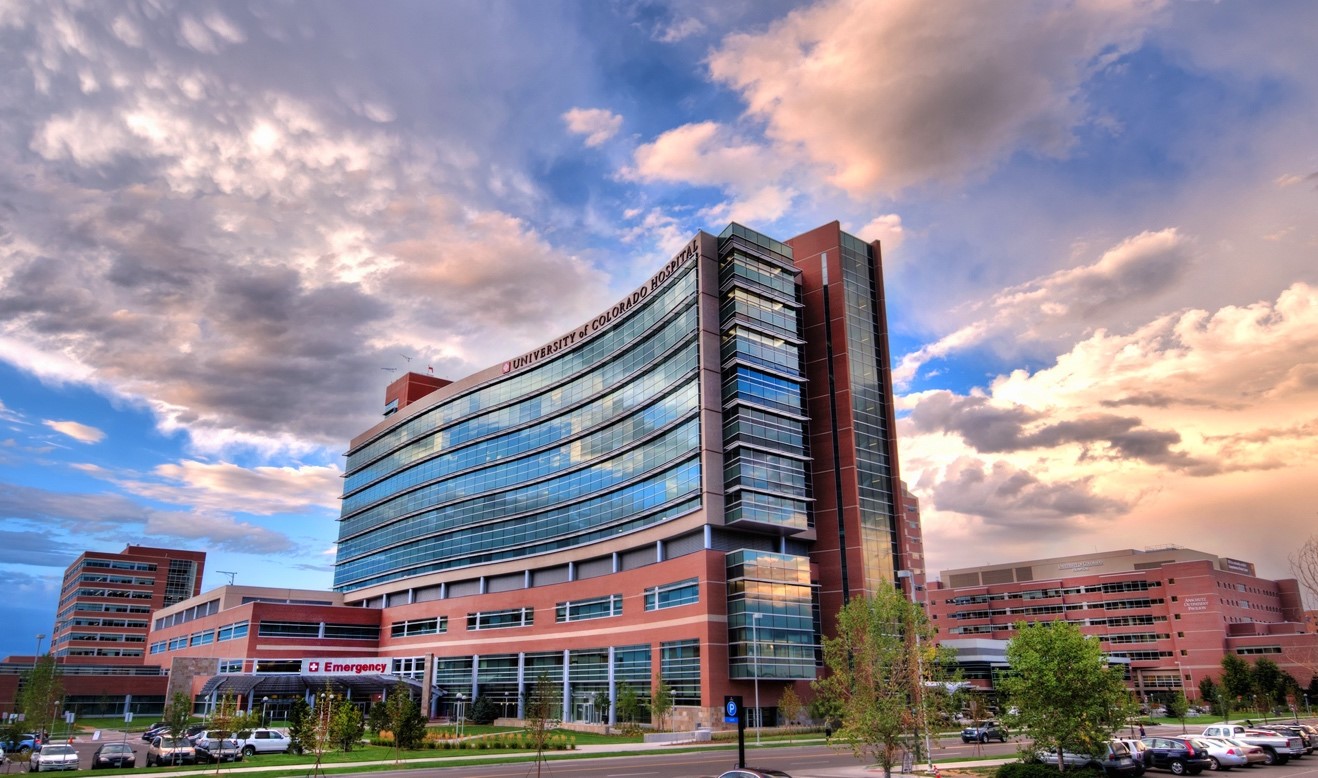
University of Colorado Hospital

Procedural Skills
All fellows are highly trained in neonatal resuscitation and encouraged to become NRP instructors during their first year of fellowship. Additionally, fellows are trained to be competent in all procedures required of an independent neonatologist, including:
Expectations and Responsibilities
Fellows are directly supervised by full-time neonatology faculty at all times. During the daytime, fellows work alongside faculty and neonatal nurse practitioners to provide high level care to infants at both clinical training sites. During the night, fellows at Children's Hospital Colorado stay in-house along with their attending. At University of Colorado Hospital, the overnight fellow practices and attending practice home-call.
At each stage of training, faculty aim to provide a level of supervision that maximizes fellow education while ensuring patient safety. Fellows assume graduated autonomy as they progress through their neonatology training. Even early in the first year, fellows begin directing clinical management decisions and coordinating complex care with subspecialty teams. Fellows are expected to take an active role in independent learning and seek out the most up-to-date information to guide patient care decisions.
Fellows have the opportunity to serve as the primary educator for pediatric residents and medical students rotating through the NICUs at both University of Colorado Hospital and Children's Hospital Colorado.
Clinical Schedule
The clinical schedule is intentionally front-loaded, with fellows spending six blocks on service during their first year of training, and three blocks during each the second and third years. This model allows fellows to gain clinical competency early on in training and have increasing protected time for personalized scholarly activities as they progress through fellowship. Rotation blocks are typically four weeks in duration, but fellows may have the option to request two-week blocks during their second and third years of training.
| Year 1 | Year 2 | Year 3 | |
| Rotation | UCH: 2 blocks CHCO: 4 blocks | UCH: 1 block CHCO: 1 block CICU: 1 block | UCH: 1 block CHCO: 2 blocks |
| Overnight Call | 50-60 nights of call per year Approximately half of overnight calls are home-call at UCH, and the other half are in-house at CHCO | ||
| Clinic | 10 half-days of medical follow up clinic per year | ||
| Elective | 1 block of elective during the 3-year training program | ||
| Didactics | Weekly protected half-day for formal education | ||

Every Wednesday, fellows attend a full half-day of protected education time, including:
12:00-1:00 Neonatal Noon Conference:
1:15-2:15 Rotating Conferences
2:30-4:30 NPM Fellow’s Lecture Series

Additional Conferences:
Additional Learning Opportunities:
Subspecialty Excellence in Educational Leadership & Scholarship (SEELS) Program :
Pediatric Fellowship Educational Series
This educational series has been developed by the Committee on Fellowship Education to address areas of scholarly interest common to all pediatric fellows. Nearly 100 sub-specialized physicians in training will attend 5-6 half-day seminars spread across their 3 years of fellowship.
Pediatric Biostatistics for Clinicians Course:
This course is primarily intended for 2nd and 3rd year Department of Pediatrics fellows as part of the comprehensive fellowship educational program. Designed to help fellows to develop an ability to be a critical consumer of the literature and develop familiarity with many commonly used statistical methods.
Advanced Degrees Available at CU:
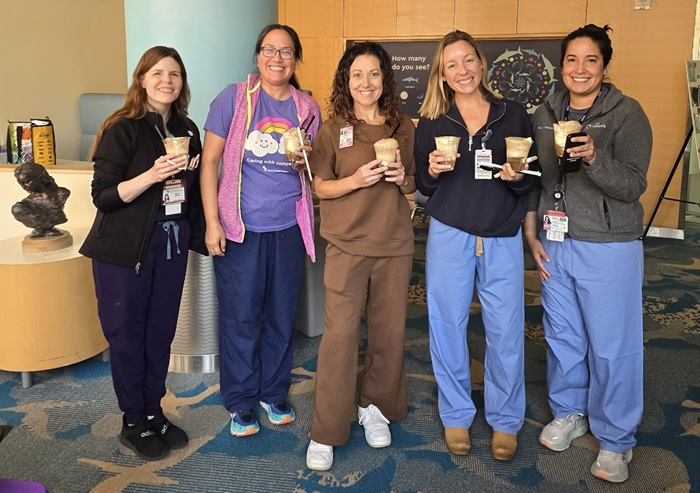
Our program has a rich history of matching and training quality neonatologists who have made significant contributions to Neonatal-Perinatal medicine. Join us!
To be considered for admission to our program, applicants must have successfully completed training in a 3-year ACGME-accredited residency program in Pediatrics.
We particularly hope to attract applicants who are motivated and self-directed learners who want to develop academic careers based on excellence in research, scholarship, and clinical neonatology. We are particularly interested in receiving applications from members of groups Underrepresented in Medicine
All application material should be submitted through the Electronic Residency Application Service (ERAS). We participate in the National Residency Matching Program (NRMP) and do not offer any positions outside of the match. Required applicates on materials include:
| Date | Activity |
| Monday, May 31, 2026 | ERAS 2026 season ends at 5 p.m. ET. |
| Wednesday, June 3, 2026 | ERAS 2027 season begins at 9 a.m. ET. |
| Thursday, June 4, 2026 | EFDO will release tokens to fellowship applicants. |
| Wednesday, July 1, 2026 | July cycle fellowship applicants may begin submitting applications to programs at 9 a.m. ET. |
| Wednesday July 15, 2026 | July cycle fellowship programs may begin reviewing applications at 9 a.m. ET. |
| May 31, 2027 | ERAS 2027 season ends at 5 p.m. ET. |
| Dates | Activity |
| Wednesday, August 26, 2026 | Match Opens |
| Wednesday, September 30, 2026 | Ranking Opens |
| Wednesday, October 28, 2026 | Quota Change Deadline |
| Wednesday, November 18, 2026 | Rank Order List Certification Deadline |
| Wednesday, December 2, 2026 | MATCH DAY |
Our pediatric fellowship will be conducting virtual interviews this upcoming interview season. We look forward to sharing our programs with you and getting to know more about you.
Interviews will be held mid September to end of October.
On the interview day, candidates will:
If you have questions about the online application and interview process, please contact our program coordinator, Michele Bialkowski via email at [email protected].
The University of Colorado offers salary and benefits packages that are competitive with other fellowship programs across the country. Current salary levels can be found at the School of Medicine - Graduate Medical Education Stipends.
Please address further questions as necessary to:
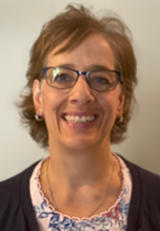
Program Coordinator
1st Year Fellow (2025-2028) |
Laura Jane-Helen McWhirter, MD
|
Harisa Spahic, MD
|
Sandra Patricia Zoubovsky, MD, PhD
|
2nd year Fellows (2024-2027) |
Zayna Marwa Bakizada, MD
|
Kylie Anne Mena, MD
|
Mariana Nino de Guzman Ramirez, MD, MPH
|
Arjun Dipak Patel, DO
|
3rd Year Fellows (2023-2026) |
Ashley Cowan, MD
|
Hannah Fuson, MD
|
Igor Shumskiy, MD
|